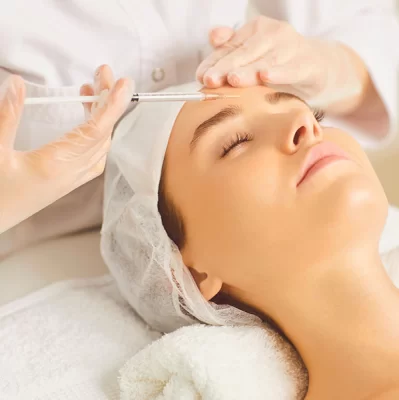Recommendations after Botox
- What are the most important recommendations after Botox treatment?
- How to take care of the skin after Botox?
- Which medications and herbs can cause harm after botox?
- When can I return to physical activity after Botox?
- What are the recommendations regarding sauna, solarium, and sunbathing after botox?
- Can you fly on a plane after getting Botox?
- How should the body position and sleep position look like after Botox?
- What to do in case of bruises, swelling, or redness after Botox?
After a botox procedure, it is important to follow several essential recommendations to achieve the best therapy results and minimize the risk of complications.
First and foremost, avoid consuming alcohol for at least 24 hours before and after the procedure. Alcohol can lead to bruising and swelling as it thins the blood.
It is not recommended to travel by plane for 24 hours after the procedure as pressure differences can negatively affect the outcome of the procedure.
For the first 7-10 days after botox, avoid exposure to high temperatures (sauna, tanning beds, or direct sunlight) as they can weaken the effect of the botulinum toxin.
For a minimum of 4 hours after the injection, avoid bending and lying down. This prevents the improper displacement of the product.
Additionally, refrain from rubbing or massaging the injection site within 24 hours of the procedure. Limit physical activity for 4 days after the procedure to reduce the risk of toxin migration and potential issues.
Adhering to these guidelines is essential for achieving long-lasting and satisfactory botox therapy results.
Check when to get your first botox treatment [here](https://www.ambasadaurody.pl/blog/kiedy-zaczac-robic-botox).
After botox, gentle skin care is recommended. Within 24 hours after the procedure, it's best to avoid wearing makeup and use mild cleansers that won't irritate the skin. Mechanical exfoliation should also be avoided as it can lead to skin irritation.
For at-home care, it's beneficial to use products containing ingredients that support skin regeneration, such as:
- hyaluronic acid,
- ceramides,
- panthenol.
Hyaluronic acid, ceramides, and panthenol are excellent for moisturizing and aiding in skin regeneration. Additionally, vitamins A, C, and E are valuable due to their antioxidant properties.
If bruising or swelling occurs after the procedure, ointments containing heparin or arnica extract can be helpful. These preparations accelerate the healing process, reduce inflammation, and minimize the visibility of bruises.
In the first few days after botox, it is crucial to protect the skin from extreme temperatures. Avoid both intense sunlight and cold to prevent exposing the skin to additional thermal stress. This will ensure long-lasting and satisfying results of the procedure. Remember to carefully care for your skin every day and follow the specialist's recommendations to achieve the best botox therapy outcomes.
Some medications and herbs can adversely affect the effects of Botox, increasing the risk of bruising, hematoma, or swelling. For this reason, it is recommended to avoid:
- Anti-inflammatory drugs such as aspirin (both before and after the procedure),
- Supplements containing vitamin E or multivitamins, as they can thin the blood,
- Herbs such as St. John's Wort, ginseng, and ginkgo biloba (a week before the injection) as their use may weaken the effects of Botox.
After undergoing a botox procedure, it is advisable to avoid intense physical activity for a few days. During this period, it is better to refrain from both visits to the gym and from performing heavy household chores.
It is particularly important to avoid high-intensity exercises and sudden movements within 5 hours after the injection. They can cause the botulinum toxin to shift, which may have a negative impact on the results of the procedure.
After a botox procedure, it is advisable to avoid using saunas and solariums as well as sunbathing. The reason? High temperatures can accelerate the breakdown of botulinum toxin, weakening its effectiveness. Therefore, for 7-10 days after the procedure, it is better to abstain from exposure to high temperatures. Additionally, intense sunbathing is not recommended before the procedure as it can dry out the skin and increase its sensitivity. Adhering to these guidelines allows for long-lasting effects of the therapy.
Right after a Botox procedure, it is not advisable to board an airplane. It is recommended to wait at least 24 hours before flying.
Air pressure differences during travel can have a negative impact on the effects of the procedure and
cause complications. It is important for the product to stabilize at the injection site, which will help avoid issues related to its displacement.
After botox treatment, it is important to pay attention to body position and sleep habits. For the first 4 hours after the injection, it is recommended to avoid bending over and lying down to prevent the movement of the substance. It is advised to sleep on your back or side to prevent pressure on the injection sites. Sleeping on the stomach can lead to undesired effects, so it's best to avoid this position in the first few days after the procedure. Following these guidelines will help achieve better results and minimize the risk of complications.
If you notice bruises, swelling, or redness after the procedure, you can use products that accelerate skin regeneration. Ointments containing heparin or arnica extract are effective in reducing bruises and inflammation. To reduce swelling, cold compresses can be helpful in providing relief and reducing swelling. Redness is usually a natural response of the body to the procedure and typically subsides on its own within a few days. However, if it persists longer, it's worth talking to a doctor.
It is important to avoid rubbing or massaging the injection sites to prevent additional irritation. It is also essential to follow general post-Botox recommendations: for the first week, avoid high temperatures and intense physical activity.
